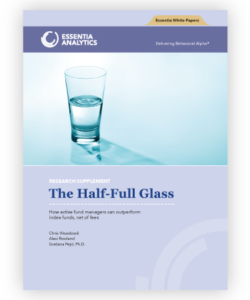By Clare Flynn Levy

Clare Flynn Levy is CEO & founder of Essentia Analytics. Prior to setting up Essentia, she spent 10 years as a fund manager, in both active equity (running over $1bn of pension funds for Deutsche Asset Management), and hedge (as founder and CIO of Avocet Capital Management, a specialist tech fund manager).
The active fund management industry is well aware that assets are flowing to index funds because managers in many strategies have not consistently outperformed their indexes, net of fees. But what if they could, and did?
Active managers are humans, and as such, they suffer from behavioral biases, like the rest of us. Mitigating these biases represents a massive alpha opportunity for anyone who is willing to do the work.
In our May research paper, The Alpha Lifecycle, we examined how active portfolio managers tend to hang on to positions past their sell-by dates, and the negative impact that has on portfolio performance.
But the bad news story is only the glass-half-empty view of this issue, in our opinion. Our research also reveals a very powerful new glass-half-full message: on average, active equity fund managers do generate alpha — a meaningful amount, in fact; well in excess of the fees they charge.
We released these findings at the Behavioral Alpha NY conference, earlier this month — you can download the full paper here.
Today, the majority of managers tend to ultimately give back all of the alpha they generate (and then some) by holding on too long. But if they could improve that behavior, and mitigate their own tendencies to fall in love with positions, we find that, on average, the alpha upside they could be achieving is 120 basis points (bps) per annum, at the portfolio level — more than enough to outperform their indexes, net of (average 75bps) fees.
How? With insight and discipline. By knowing their own alpha lifecycle (and it is knowable; we calculate each of our clients’ alpha lifecycle curves), portfolio managers can then reassess their positions — and consider an exit — while still generating value well in excess of the benchmark index.
This research challenges the active vs passive orthodoxy — which seems to assume that active portfolio managers cannot improve their performance — and fundamentally changes the discussion. It’s no longer a given that passive fund investing is more cost-effective than active. It’s now whether — and if so, how — active managers can realize the alpha we know they’re generating before it decays away.
Both alpha lifecycle papers — The Alpha Lifecycle and The Half-Full Glass — are available for free download from the White Papers & Case Studies section of this website.



